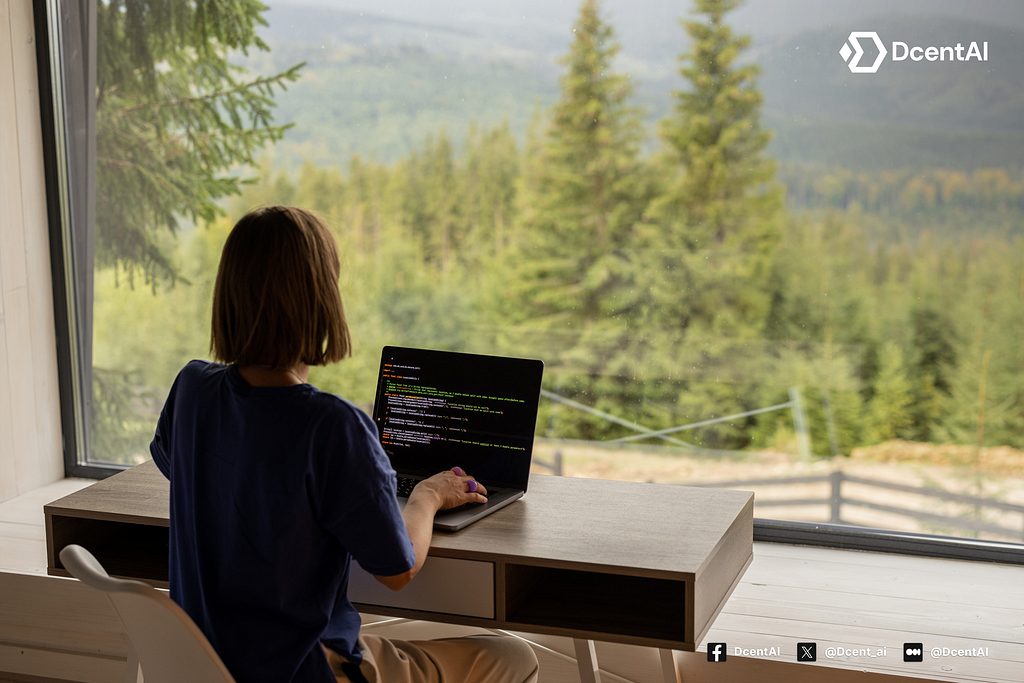The Future of Remote Work with Decentralized AI Tools

The rise of remote work has fundamentally changed the traditional working environment, requiring that businesses adjust to creative functional approaches. Artificial intelligence improves productivity, communication, and participation in distant teams. Decentralized AI technologies go even further, providing adaptable, secure, and compelling answers to the unique difficulties that remote workers experience.
Networks like DcentAI are at the forefront of these advances, giving advanced AI-powered tools and infrastructure that permit remote teams to collaborate.This article will look at the long-term of remote work through the perspective of decentralized AI innovations, highlighting their benefits, limitations, and viable applications.
Become a pioneer of DcentAI community!Benefits of Decentralized AI for Remote WorkDecentralized AI tools transform remote work by providing powerful, flexible, and secure solutions. Here’s how these advancements are making remote work more effective and efficient:
Enhanced Collaboration and CommunicationDecentralized artificial intelligence frameworks allow smooth communication and collaboration over remote teams. harnessing AI-powered platforms, team members can smoothly share data, collaborate on projects in real-time, and maintain high output levels regardless of their physical location. AI, for instance, may automate scheduling, organize virtual gatherings, and integrate numerous communication channels into a unified process, keeping team members connected and motivated.
Scalability and FlexibilityDecentralized AI provides scalable solutions that can grow with a company’s needs. Remote teams can access the necessary computational resources on demand, ensuring they have the tools required to handle varying workloads without traditional infrastructure constraints. This flexibility allows businesses to quickly adapt to changing demands, scale up operations during peak times, and scale down when less capacity is needed while maintaining performance and efficiency.
Improved Security and Data PrivacyDecentralized AI distributes sensitive data across numerous nodes, lowering the threat of data breaches and adding security. This decentralized technique improves data privacy because the information isn’t stored in a single, susceptible location. Companies can use modern encryption technologies and AI to discover and respond to implicit security threats in real time, resulting in a strong defense against cyberattacks.
Cost-Effective SolutionsDecentralized AI tools provide cost-effective alternatives to standard centralized systems. Companies can save costs on physical infrastructure maintenance and upgrades by distributing processing power and storage across a network. This resource distribution reduces the need for precious data centers while allowing for more effective use of existing means, resulting in significant cost reductions.
Access to Advanced AI ToolsRemote teams can use the most recent AI technologies without making major upfront commitments. Decentralized AI platforms offer distant workers access to cutting-edge tools and resources, allowing them to remain competitive and inventive. Whether it’s advanced machine learning methodologies, natural language processing, or data analytics, these tools enable remote teams to handle complicated problems and produce high-quality results.
Real-Time Insights and AnalyticsDecentralized artificial intelligence architectures can process and analyze vast data in real-time, giving remote teams valuable insights and analytics. This capability facilitates rapid and informed decision-making, essential for sustaining effectiveness and productivity in remote work. AI-driven analytics can detect patterns, predict issues, and enhance operations, thereby offering teams a competitive edge within their industries.
DcentAI is leading the way in delivering these decentralized AI solutions, guaranteeing that remote work isn’t only doable but also comprehensive and secure. DcentAI helps remote groups overcome the issues of distributed work settings by providing various AI-powered solutions, permitting them to flourish in a rapidly changing digital landscape.
Challenges in Implementing Decentralized AI Tools Future of Remote Work
While decentralized AI tools hold great promise for enhancing remote work, their implementation comes with several challenges. These include technical hurdles, data privacy concerns, and resource requirements. Let’s delve into each of these challenges:
Technical and Integration ChallengesImplementing decentralized AI tools requires advanced technical expertise and seamless integration with existing systems. Organizations may have difficulty changing their current infrastructure to enable decentralized AI, which regularly requires significant changes to their IT architecture. Moreover, establishing compatibility with various decentralized AI frameworks and current applications can be difficult and time-consuming. This difficulty is amplified by the quick speed of technology advances, which require continuous upgrades and maintenance to keep systems working well.
DcentAI offers full support and integration services to assist organizations in a smooth transition to decentralized AI. By providing solutions and experienced coaching, DcentAI guarantees that the deployment process is effective and least disruptive to existing operations.
Data Privacy and Security ConcernsOne of the primary issues in using decentralized AI tools is guaranteeing data privacy and security. As data is distributed over several nodes, safeguarding sensitive data from undesirable access becomes more troublesome. Organizations must utilize solid encryption and secure data transmission protocols to protect their data. Compliance with various data protection rules, such as GDPR and CCPA, adds complexity.
DcentAI employs innovative encryption algorithms and decentralized storage frameworks to improve data security. By distributing data across its network and implementing strict access controls, DcentAI ensures that sensitive information is protected and regulatory compliance is maintained.
Resource and Cost RequirementsTransitioning to decentralized AI instruments can be resource-intensive, requiring significant investment in new technologies and personnel job training. Numerous businesses, especially small and medium-sized enterprises, may find the starting setup expenses, as well as continuous support and overhauls, restrictively costly. Furthermore, the demand for specialized skills to oversee and maintain decentralized AI frameworks may burden current human assets.
DcentAI provides cost-effective solutions by connecting to a decentralized network of GPU and storage assets. This empowers enterprises to scale their AI capabilities without incurring enormous upfront costs. DcentAI also offers training and support to help organizations learn the skills required to manage and utilize decentralized AI solutions properly.
Real-World Example Implementations of AI for Remote Work
Here are some of the real-world examples of AI for remote work:
Microsoft Teams and AI for Enhanced CollaborationMicrosoft Teams employs AI to enhance remote work by providing capabilities such as real-time translation, background noise suppression, and intelligent conference recaps. These AI-powered solutions improve communication and participation, making distant teams more productive. For example, the real-time translation capability guarantees that meeting participants who may not have the best sound quality can participate and contribute.
Slack’s AI-Driven Workflow AutomationSlack employs AI to automate repetitive activities and streamline workflows for distant teams. AI-powered updates, automated status updates, and workflow builders help remote workers oversee their workloads more successfully. Slack’s AI can estimate when to inform users about prospective due dates or push team individuals to offer project updates, expanding productivity and diminishing administrative work.
Zoom’s AI Enhancements for Virtual MeetingsZoom leverages artificial intelligence to refine the virtual conference experience through highlights like background noise lessening, virtual backgrounds, and automatic speaker framing. These AI functionalities significantly lift the quality of video conferences, rendering remote meetings more feasible and engaging. For example, AI-powered noise reduction eliminates undesirable background sounds, permitting members to concentrate more intensely on the discussion. Zoom has risen as an essential platform for remote work, especially in light of the broad shift to remote operations urged by the COVID- 19 widespread.
GitHub’s Copilot for Code SuggestionsGitHub’s Copilot, an AI-powered code completion tool, helps developers work remotely by proposing code snippets and automating repetitive coding tasks. This AI solution increases coding effectiveness and reduces time spent on tedious activities, permitting remote development teams to be more productive. Copilot gives contextually appropriate proposals based on code in a repository, which speeds up the coding process and enhances collaboration among remote developers.
Trello’s AI-Powered Task ManagementTrello uses AI to optimize task management for remote teams. AI features in Trello include intelligent cards that predict due dates based on task patterns, automated task sorting, and prioritization. These AI enhancements help remote teams stay organized and manage their projects more efficiently. For instance, smart cards can automatically categorize tasks based on urgency and importance, ensuring that team members focus on the most critical tasks first.
DcentAI’s Decentralized GPU and Storage SolutionsDcentAI provides decentralized AI tools and infrastructure that support remote work by offering scalable GPU and storage solutions. Companies utilizing DcentAI’s services benefit from increased computational power and data security, allowing them to run complex AI models and store enormous datasets without costly on-premises infrastructure. This strategy saves costs and guarantees that remote teams have access to the resources they require, regardless of their location. For example, a remote AI business can utilize DcentAI’s decentralized infrastructure to train large-scale machine learning models, shortening its product development cycle and eliminating the limits of traditional centralized solutions.
Final ThoughtsThe integration of decentralized AI tools is set to transform long-term remote work. These advances provide exceptional benefits, such as enhanced collaboration, efficient work automation, and robust data security. As remote work gains popularity, decentralized AI advances will become increasingly vital in addressing obstacles such as resource limitations, data privacy issues, and the necessity for scalable solutions.
DcentAI demonstrates how a decentralized AI framework can assist distant teams by giving affordable GPU and storage resources.Companies can use these tools to boost efficiency and innovation, performing in a more dynamic and flexible remote workforce. As we move forward, the constant innovation and adoption of decentralized AI will form a more effective, secure, and connected remote work environment, ultimately shaping the future of work toward greater adaptability and sustainability.
Become a pioneer of DcentAI community!To learn more about DcentAI, visit our Facebook and X accounts.The Future of Remote Work with Decentralized AI Tools was originally published in Coinmonks on Medium, where people are continuing the conversation by highlighting and responding to this story.
